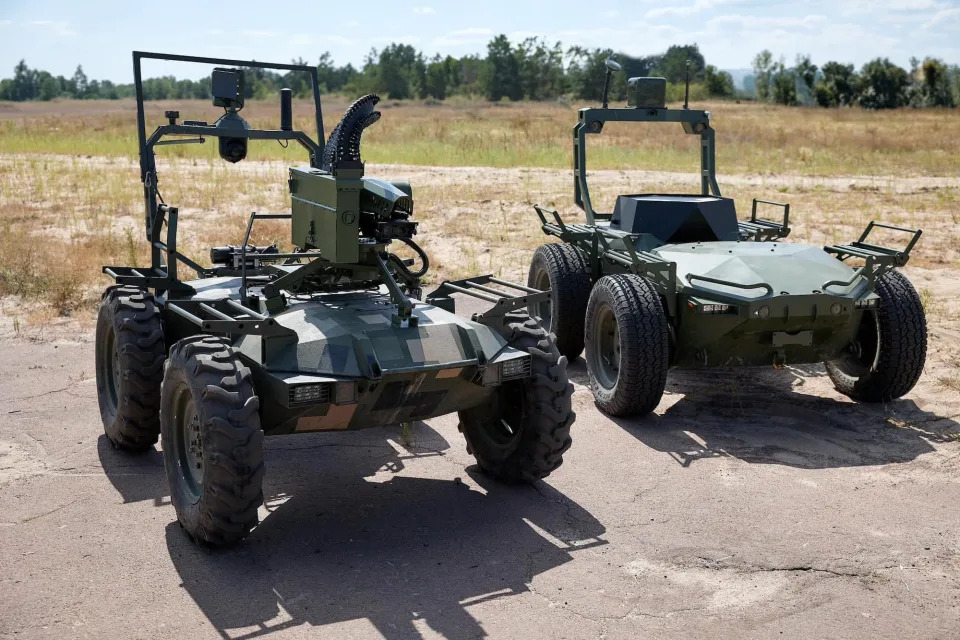Russia struggles to find enough troops even with increased pay
Russia is struggling to meet its military recruitment targets, despite offering "increasingly lucrative" salaries to servicemen during the course of the Ukraine war, the UK's Ministry of Defence has said.
On 4 February 2022, the day the Kremlin's forces launched their full-scale invasion, Vladimir Putin noted that a lieutenant would receive 81,200 rubles, which would be worth around £675 today.
As the war dragged on, Putin said even mobilised private soldiers would receive 195,000 rubles per month, now worth £1,620.
Money offered to troops has kept on climbing, with the MoD claiming that "many junior ranks serving in Ukraine are now on over 200,000 rubles (about £1,660 per month).
To put this in relative terms, this is over 2.7 times Russia's national average salary of 72,851 rubles. The MoD adds: "By way of comparison, 2.7 times the average UK salary would equate to over £90,000 a year."
...
The ministry concludes: "It is highly likely that the salary and additional benefits are a strong incentive for personnel to join up, especially to those from the poorer areas of Russia. However, Russia is still unlikely to meet its targets for recruiting volunteers to the ranks."
Having lost tens of thousands of men in the war, the Kremlin has been trying to boost its military's numbers, with Russia voting in July to raise the maximum age at which men can be conscripted to 30 years from 27.
This increased the number of young men liable for a year of compulsory military service at any one time.
Last year, Russia announced a plan to boost its professional and conscripted combat personnel by more than 30% to 1.5 million, an ambitious task made harder by its heavy but undisclosed casualties in Ukraine.
Conscripts cannot legally be deployed to fight outside Russia and were in theory exempted from a limited mobilisation last autumn that gathered at least 300,000 men with previous military training to fight in Ukraine - although some conscripts were sent to the front in error.
However, Russia unilaterally claimed four Ukrainian regions as its own last September - in a move not recognised internationally - fuelling fears that raw conscripts could now legally be sent into battle.
...
Russia has also been running a propaganda campaign, emotionally manipulating men into signing up, with wives of soldiers and other women frequently appealing to their masculinity on TV news interviews, according to the New York Times.
...
A lot of military-aged men fled Russia at the beginning of the war. I have seen estimates that over a million fled. With the substantial casualties Russia has incurred since attacking Ukraine there is even less incentive for volunteers even with the use of women to manipulate recruitment. There have also been complaints about the troops not receiving the promised pay and Russia has also been accused of making families pay for the return of bodies of dead soldiers. Other stories indicate Russia is leaving the bodies on the battlefield to avoid payments to families. Russia has tended to show a lot of callousness toward troops it has sent into combat, especially those recruited from prisons. With the Wagner group's loss of leadership and no longer an effective force, it compounds its problems.
...
Russian sources continued to express concerns over Russian vulnerabilities in eastern and western Zaporizhia Oblast. One Russian milblogger claimed that the situation near Verbove (18km southwest of Orikhiv) is “very dangerous.”[8] Russian “Vostok” Battalion commander Alexander Khodakovsky, reportedly defending the eastern Donetsk-western Zaporizhia Oblast border area, claimed that Russian forces in his sector are stretched in a long arc along the frontline, are having difficulties transferring reserves, and lack resources.[9] Khodakovsky claimed that Ukrainian efforts to cut off Russian transport routes would further complicate the situation.[10] Khodakovsky has previously highlighted concerns about the Russian defense in the eastern Donetsk-western Zaporizhia Oblast border area, specifically relating to poor Russian counterbattery capabilities, heavy Russian losses, exhausted Russian forces, and a lack of reserves.[11] The “Vostok” Battalion claimed that Ukrainian forces disrupted their logistics on August 28 by striking their rear area with drones.[12] The “Vostok” Battalion noted that Ukrainian shelling has wounded several of its personnel and that Russian electronic warfare (EW) systems are failing to down Ukrainian aircraft and drones.[13] Khodakovsky’s and the “Vostok” Battalion’s complaints are likely those of tactical commanders focused on their own local issues on a sector of the front that is of lower priority to Russian theater commanders who are focusing efforts in western Zaporizhia. These concerns could well be valid, but senior Russian commanders could have contingencies in place should the situation here deteriorate that they have not troubled to communicate to Khodakovsky and his colleagues. Such tensions between de-prioritized tactical commanders and higher commanders are not uncommon in war.
...
See, also:
And:
Ukraine showed off experimental new land drones, including one mounted with a turret
...
The photos showed one mounted with a camera and what might be a turret and a feed for ammunition:
Germany arrests a man accused of illegally exporting electronic components for drones to Russia
And:

Comments
Post a Comment